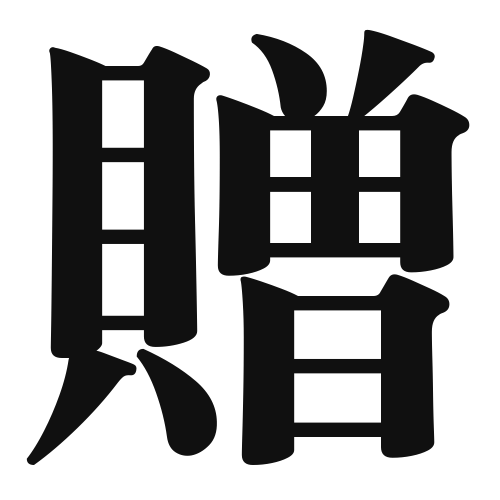1. Overview of Meaning
The kanji “贈” (pronounced “zō” in Japanese) means “to give” or “to present.” It is often used in the context of giving gifts or offering something to someone as a gesture of goodwill.
2. Formation and Radical
Formation of the Kanji: The kanji “贈” is a compound character, which means it is formed by combining different elements. It consists of the “貝” (shell) radical, which is often associated with wealth or valuables, and the character “贈,” which conveys the idea of giving or presenting.
Radical: The radical of “贈” is “貝,” which signifies items of value, particularly in the context of gifts or money.
3. Examples of Usage
Common Words and Phrases: Some frequently used words that include “贈” are “贈り物” (okurimono – gift) and “贈呈” (zōtei – presentation).
Example Sentences in Daily Conversation:
- 彼は友達に誕生日の贈り物を用意しました。 (He prepared a birthday gift for his friend.)
- この賞は彼に贈呈されます。 (This award will be presented to him.)
4. Synonyms and Antonyms
Similar Kanji: A similar kanji is “与” (yo), which also means “to give,” but it is often used in a more formal or official context, such as giving orders or permissions.
Opposite Kanji: The opposite kanji is “取” (toru), which means “to take” or “to receive,” indicating the action of receiving rather than giving.
5. Cultural and Historical Background
Relation to Japanese Culture: In Japanese culture, the act of giving gifts is highly valued, especially during special occasions such as birthdays, weddings, and holidays. The kanji “贈” reflects this cultural significance.
Proverbs and Idioms: One common saying is “贈り物は心を込めて” (Okurimono wa kokoro o komete), which means “A gift should be given with sincerity,” emphasizing the importance of the intention behind the gift.
